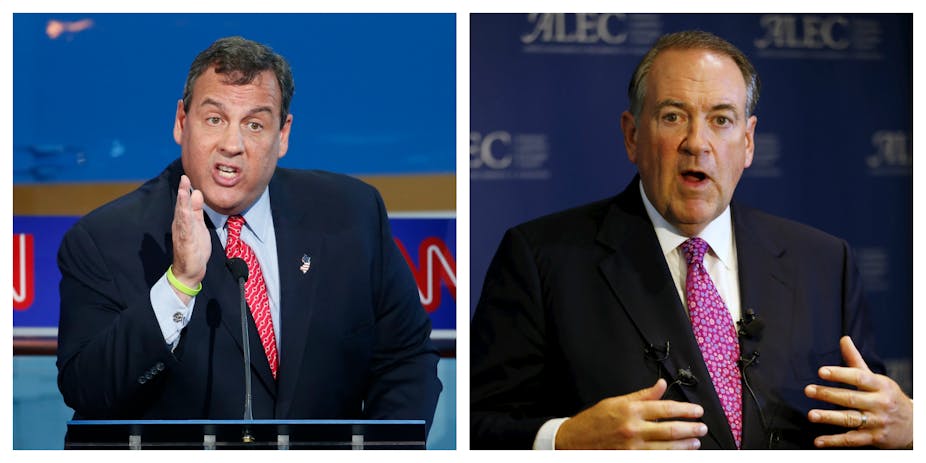Polling is more important than ever in US presidential politics.
In the 2016 campaign, the polls now function as a primary election of their own, forcing candidates out of the race and influencing which candidates the media views as viable.
In September, low poll numbers drove two major 2016 contenders, Scott Walker and Rick Perry, to drop out of the race months before any voters cast ballots. In October, Vice President Joe Biden declined to enter the race at least in part because of polling data.
Polls even determine which candidates the debates include and which they leave out. The Fox Business Network bumped Chris Christie and Mike Huckabee from Tuesday night’s primetime GOP debate because of low poll numbers. Similarly, the Democratic National Committee excluded Harvard professor Lawrence Lessig from the Democratic debates because he failed to register high enough in the polls.
None of this would be alarming if polling data accurately reflected popular opinion. But history shows that the polls are wrong more often than they are right.
A terrible track record
Despite the rise of “Big Data” statistical methods, polls have an appallingly poor track record in recent elections.
The 2004 election provides a case in point. Two weeks before the Iowa Democratic caucuses, pollsters declared that Vermont Governor Howard Dean held a commanding lead. Massachusetts Senator John Kerry lagged so far behind Dean in the polls that Kerry’s campaign verged on collapse.
But the moment voters started to cast actual ballots, Dean’s lead disappeared. In the January 2004 Iowa caucuses, Kerry won in dramatic fashion, finishing far ahead of Dean, who ended up a distant third. Dean dropped out of the race in February and Kerry went on to win the Democratic nomination.
2004 was not an aberration. The same phenomenon has played out time and again.
In the 2008 GOP presidential race, national polls placed Rudy Giuliani in first place shortly before the Iowa caucuses.
But the polls had it completely wrong. Giuliani suffered crushing defeats in Iowa, New Hampshire and Florida. He dropped out of the race in late January 2008, a collapse unimaginable just one month before.
Similarly, in December 2011, Newt Gingrich had a 15-point polling lead in the Republican nomination race. But voters saw things far differently than the pollsters did. In early January 2012, Gingrich experienced devastating defeats in the Iowa caucuses and New Hampshire primary. Gingrich never recovered as Mitt Romney cruised past him and secured the GOP nomination.
Ironically, Romney himself would later be the victim of bad polling data. On the morning of the November 2012 general election, the Romney campaign’s private internal polls indicated that Romney would decisively defeat President Obama.
When the real election results came in, Obama won reelection with five million more votes than Romney.
History thus demonstrates that politicians rely on polls at their peril.
Celebrity X factor
Donald Trump’s presence in the race makes matters even murkier this year. Since the days of Ronald Reagan, charismatic candidates from the entertainment industry have attracted large numbers of infrequent and first-time voters, segments of the electorate not included in conventional polls of likely and registered voters.
The result is celebrity candidates tend to perform much better than their poll numbers suggest.
For example, in the 1998 Minnesota governor’s race, former wrestler Jesse Ventura had only 15% support in statewide polls. But on election day, Ventura attracted thousands of new voters, which enabled his stunning victory in the gubernatorial election.
The same phenomenon played out in California five years later. In the 2003 California governor’s race, the actor Arnold Schwarzenegger had no experience in public office and lacked any obvious qualifications for the job. But he benefited enormously from his worldwide fame and the media’s intense coverage of his campaign, which contributed to high voter turnout especially among disaffected middle-class voters. Schwarzenegger easily won the election.
Donald Trump’s campaign looks a lot like the Schwarzenegger and Ventura campaigns. If Trump attracts big numbers of new voters to participate in the 2016 GOP primaries, then his strength among Republican voters may far exceed what the polls currently indicate.
Anybody’s race to win
The bottom line, therefore, is smart candidates ignore the polls.
The 2008 campaign serves as a prime example. John McCain and Barack Obama both trailed badly in the polls before the first caucuses and primaries. But neither allowed poor poll numbers to drive them from the race. They stuck it out and the voters ultimately rewarded them for their determination. When the actual voting began, McCain and Obama surged ahead of their opponents and captured their parties’ respective nominations.
The example of the McCain and Obama campaigns is particularly important for struggling candidates who might consider getting out of the 2016 race too early. Although the polls kept Chris Christie and Mike Huckabee off Tuesday night’s debate stage, polling data and political forecasting constitute little more than guesswork. Regardless of what the polls say, the reality is we have no idea what will happen until voters cast the first ballots in Iowa on February 1 and New Hampshire on February 9.
In the meantime, forget the polls. With more than 80 days to go until the Iowa caucuses, it’s still anybody’s race to win.

